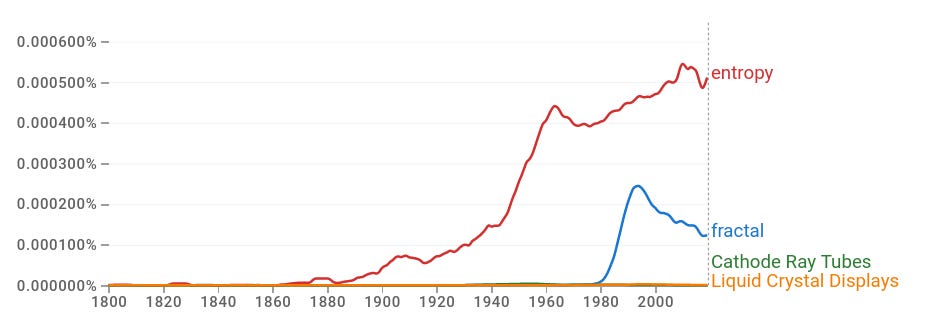Sometimes I wonder. “What words stirred up my techbro ascendants?”. Or rather, what words defined the 20th century tech scene. I consulted my CS professors, as well as the senior programmers at my job to compile this list. These are 2 words that achieved similar notoriety to Blockchain, ChatGPT and Internet-of-Things but between the 40’s and early 2000’s. I used Google Ngram to rank the words by popularity at the end of the article. I also used SBIR to find data on government funding.
These technical words pervaded themselves into popular culture, and may have helped you raise VC rounds between 1940 and 2000:
Fractal (1978)
A word coined by Benoit Mandelbrot to describe self-repeating patterns. In my opinion, this was the ultimate buzzword. From my readings, fractals were appealing as they helped researchers describe complex shapes like clouds and coastlines. They were especially useful as measure of dimension. For instance, geographers determined that Great Britain existed in 1.25 dimensional space - I don’t know what this means but it sounds cool ✨
Say you were a VC looking to fund a company in the fractal space. What startups would you encounter? According to my CS professor, fractal image formats were popular in the early 2000s. So popular in fact, that the US Department of Defense awarded multiple million dollar-contracts to a company that made JPEGS but with fractals. I know this sounds familiar.
Companies that made fractal antennas were also popular. I lack the patience to sift through buzzy content so you can read about them here.
Entropy(1948)
Claude Shannon - a weird white man from MIT- defined entropy as a measure of useful information in a message. Entropy was popular because it determined file sizes and more recently, internet speed. As pointed out by a senior programmer, entropy became a buzzword because no one - not even Shannon - knew what the word meant.
So management consultants began to offer entropy reduction (a fancy word to mean laying off people). Humanities professors authored papers on social entropy(I tried my best but idk what this means). Then there were econ bros talking about entropy models for brand purchase behavior.
Tech companies also received government funding for projects involving entropy. Here is one company that received close to 100,000 dollars for maximum entropy de-duplication. In a nutshell, they deleted copies within a database. You know, the CTRL+F and Delete combo. However, they described their work as “high-risk, high-return research towards creating general-purpose de-duplication software.”✨
Claude Shannon disliked his life’s work reduced to a buzzword. In a paper titled, The Bandwagon, he sought to address the use and misuse of the term entropy. In the paper, he acknowledged that entropy had achieved popularity, but he asserted that “the use of a few exciting words like information, entropy, redundancy, do not solve all our problems”
Extra mentions - Cathode Ray Tubes, Liquid Crystal Displays, Residual Number Systems.
From Google Ngram we see that entropy was the most popular word in our list. Entropy became popular in the 1950’s and has grown ever since. Fractal became mainstream in the 1980’s but the word’s drifting deeper into obscurity.
What other buzzwords do you know?



